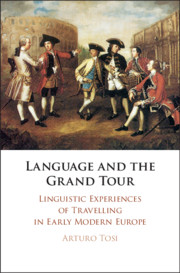Book contents
- Language and the Grand Tour
- Language and the Grand Tour
- Copyright page
- Dedication
- Dedication
- Contents
- Figures
- Preface
- Acknowledgements
- Chronology
- Introduction
- Part I Attitudes and Aptitudes
- Part II Encounters and Exchanges
- Part III Contrasts and Collisions
- 7 Perceptions of Linguistic Diversity
- 8 Instances of Language Contact
- 9 Women Travellers and Gender Issues
- 10 Conclusion
- References
- Index of Names
- Subject Index
10 - Conclusion
from Part III - Contrasts and Collisions
Published online by Cambridge University Press: 23 March 2020
- Language and the Grand Tour
- Language and the Grand Tour
- Copyright page
- Dedication
- Dedication
- Contents
- Figures
- Preface
- Acknowledgements
- Chronology
- Introduction
- Part I Attitudes and Aptitudes
- Part II Encounters and Exchanges
- Part III Contrasts and Collisions
- 7 Perceptions of Linguistic Diversity
- 8 Instances of Language Contact
- 9 Women Travellers and Gender Issues
- 10 Conclusion
- References
- Index of Names
- Subject Index
Summary
A typical attitude of the civilised Renaissance man, who valued freedom of expression and adopted a playful attitude towards models of foreign behaviour, was the proclivity to improvise in foreign languages in order to communicate. The early eighteenth century was the turning point leading into the second phase, which began when travellers became conscious that English was a rich and vigorous language, something which affected attitudes towards non-standard varieties of English at home and speakers of other languages abroad. The language attitudes many Britons took abroad from that time on included a new self-consciousness about speech and a strong sense of anxiety about correctness. As they were now concerned about linguistic models of polite social behaviour, their efforts went into using the right language with the right people. The spirit of improvisation typical of the post-Renaissance gave way to a new sense of language as a marker of social and cultural identity. At the same time, the ideology of a ‘pure’ language and the belief that members of polite society in any nation have the monopoly of it, informed their views of language everywhere.
Keywords
- Type
- Chapter
- Information
- Language and the Grand TourLinguistic Experiences of Travelling in Early Modern Europe, pp. 260 - 267Publisher: Cambridge University PressPrint publication year: 2020

